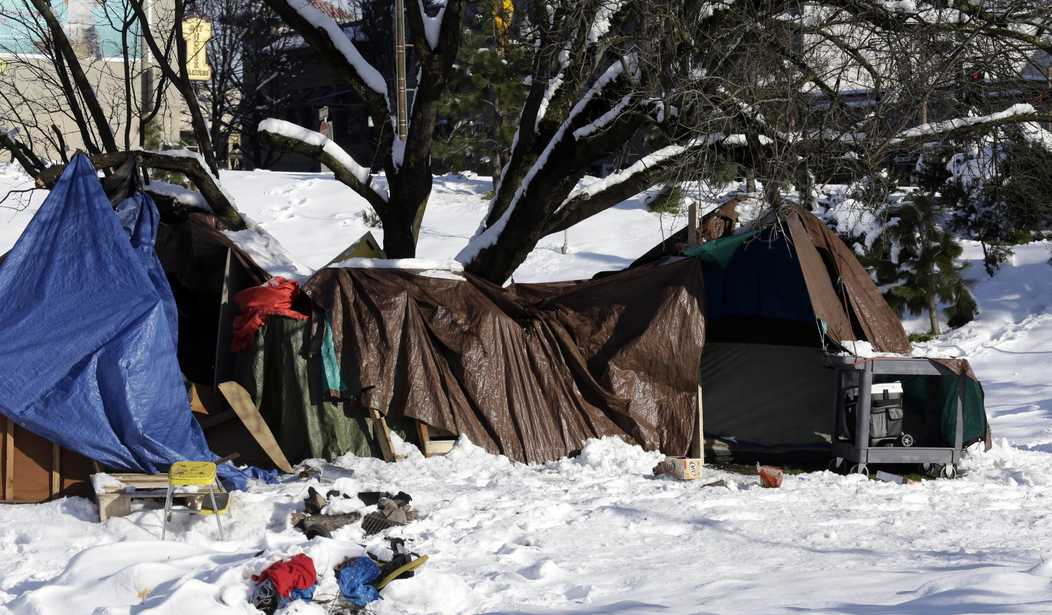A baby that was born in a homeless camp in Portland, Ore., was found dead at a bus stop in January, calling into question the city’s response to homelessness and mental health needs of the most vulnerable.
The details of the baby’s short time on this earth are difficult to comprehend. Some confusion initially surrounded the circumstances of the birth, but it now appears that the baby was stillborn to a 34-year-old woman suffering from severe mental illness and living in a transient camp. The state medical examiner has ruled it a stillbirth, so a homicide investigation will not be conducted.
Police responded to a 911 call from a man on his way to work who told officers that a woman pushing a shopping cart opened her coat to show him her new baby. According to the police report, the woman was only partially clothed and was barefoot, so the man told her to cover the baby back up. The temperature at the time hovered around freezing.
Portland has seen an explosion in its homeless population over a period of a few years. The cityscape is dotted by an ever migrating system of homeless camps. Panhandlers can be seen on many street corners and freeway onramps at all hours of the day and night. Combined with this ever more dire problem, Portland has seen one of its most severe winters in decades, with several snow and ice storms snarling traffic and plunging temperatures well below freezing for an abnormally large number of days in December and January.
The baby is the fifth homeless person to die in Portland’s unusually severe winter weather in January alone.
The police report tells a bit of a confusing story, likely owing to the severity of the mother’s mental state:
Shortly before 6 am on Jan. 9, officers from the Portland Police Bureau responded at a TriMet bus stop at Southeast 91st Avenue and Powell Boulevard.
The 911 operator texted details to the responding officers.
“Baby was born in a transient camp near Chuck E. Cheese,” the text message said. (There’s a Chuck E. Cheese’s at 9120 SE Powell Blvd.)
The birth occurred hours earlier, officers learned, and the baby had remained outside in weather that hovered near freezing. The texts indicated the baby was alive.
“Baby is conscious and breathing okay, but has been outside this entire time,” read a second text. “Baby is ice cold.”
An ambulance rushed the child to Oregon Health & Science University Hospital.
It turns out that these initial notes were incorrect, and the medical examiner determined that the baby was stillborn. While resuscitation attempts were conducted by medical staff, the police were unable to get a straight answer from the mother. The woman told police that she had conceived by immaculate conception, and could not answer basic questions about her identity, ethnicity, or even where the baby was born.
A police spokesman later clarified that the death “did not appear to be weather-related, and no criminal investigation was planned.”
Portland Mayor Ted Wheeler, sworn in on January 1, said that the tragedy was a “damnation of our response to untreated mental illness. It’s horrible.”
It remains to be seen what solutions will be offered by a city that has seen an explosion in its homeless population. Much has been made of the crisis in political circles, but the problem only continues to grow as politicians talk.
Further, recent studies show that the city and the state lag woefully behind in responding effectively to mental illness in the community. A 2014 federal report confirmed large gaps in effective treatment options:
The state has made only “limited progress” in helping mental health consumers, said Marshall and Jonathan Smith, section chief of the U.S. Department of Justice’s Special Litigation Section in the Civil Rights Division.
The January report found the number of community-based crisis intervention services for people suffering from mental illness remained flat in 2013, and community housing for them decreased.
Federal officials also learned that some of the community mental health services that do exist aren’t meeting quality standards.
Further, the state’s data is lacking and questionable, they said.
“What’s become clear is they don’t know what services specifically exist in our communities and have no way to evaluate the quality and whether they’re really meeting the needs of people with serious mental illnesses,” Marshall said. “There’s basically a lack of management and oversight.”
No more stark demonstration of this lack of management and oversight exists than the plight of this baby who was conceived and died directly in the crack in the system.









Join the conversation as a VIP Member